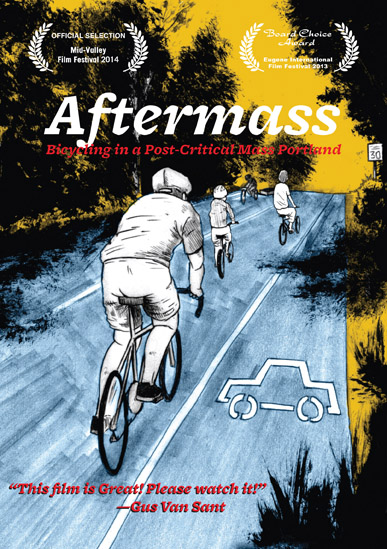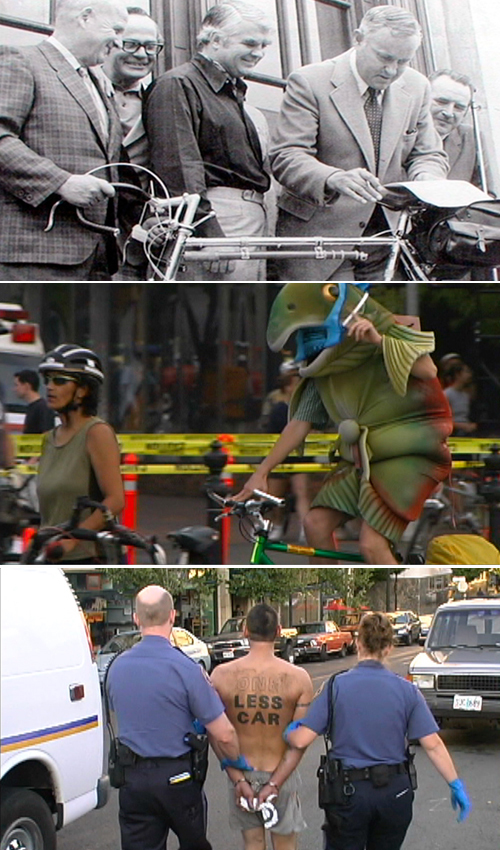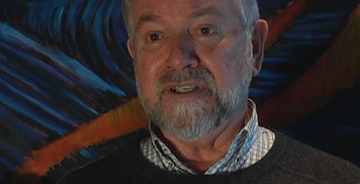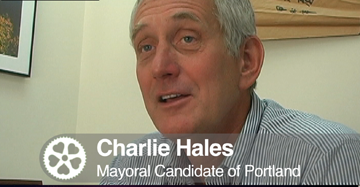Aftermass: How Portland Became North America's Bicycle Capital
 The world looks to Portland, Oregon as an example of how bicycle culture can blossom out of the ruinous freeways of car-oriented civilization. Aftermass is the first feature documentary to explore the events, people, politics, and social changes that led to Portland becoming the first major bicycle city in the United States.
The world looks to Portland, Oregon as an example of how bicycle culture can blossom out of the ruinous freeways of car-oriented civilization. Aftermass is the first feature documentary to explore the events, people, politics, and social changes that led to Portland becoming the first major bicycle city in the United States.
Aftermass features many of the leaders and major participants behind the growth of bicycling ridership since 1971. The narrative demonstrates the complex dynamic throughout the 1990s between advocacy organizations, politicians, city planners, and the then new, grassroots Critical Mass ride. The film is full of smiling faces on two wheels, but also explores the controversies, setbacks, and bumps along the way, including riots, political roadblocks, and an illegal police spy.
The film provides new and vital insights into Portland's transportation history as well as into paths other cities can follow to healthy planning and a green future.
Please listen to Gus Van Sant who said, “This film is Great! Please watch it!” and tell all of your friends!
The Reviews Are Rolling In
"With candid interviews from key players in Portland’s bike legacy and new reporting on dubious, anti-bike police activities, the film explores what led up to Critical Mass and what has happened since the iconic protest ride has fizzled out." —Bike Portland
"This movie will likely change your whole perspective on the history of the bicycle movement and your own role in the future of it." —Elly Blue, Bikenomics
Ready? own a copy here, stream it online, or download the soundtrack.
The DVD contains nearly 1,000 historical and legal documents and 22 bonus films and deleted scenes culled from our massive research vault.Screenings have included: Chicago, Pro Walk, Pro Bike, Portland, Phoenix, AZ, Oakland, CA, San Diego, the Mid Valley Film Festival, many dates on the Dinner and Bikes tour, and winning the Board Choice Award at Eugene International Film Festival.
Take a test ride around the block here:
 Still curious? Check out this interview on PRP Radio and this one on The KBOO Bike Show!
Still curious? Check out this interview on PRP Radio and this one on The KBOO Bike Show!
You can stream the film here: or buy a DVD with four hours of bonus material here!
Aftermass from Ananda Media on Vimeo.
The Making Of

Back in October of 2008, Rev Phil Sano and Joe Biel sat around talking about how much they'd like to watch a documentary about the history of Portland's Critical Mass. Shortly thereafter we scrapped together a trailer before we were each distracted by other film projects and Phil moved to Seattle. In the summer of 2009 Joe returned to begin making the film in earnest.
What does it mean that Portland, one of the best North American cities for cycling, has virtually no Critical Mass? Was it no longer relevant, did its activity not appeal to a cycling “mainstream,” or was a police crackdown just so successful? What are the new goals of cyclists? What activities had been so politically successful for building Portland's bicycle infrastructure and culture? What is the new activism? How are objectives reached? And perhaps most importantly, had Critical Mass compounded with other activism and advocacy to create North America's premiere bicycling mecca?
Quickly it became clear that the narrative was more complicated than we had previously thought. It all began with the Oregon Bike Bill in 1971 but progress disappeared for over twenty years until forces converged in city hall, as advocacy, activism, and funding for projects materialized in the 90s.

Portland was declared a "platinum" city for bicycling in 2008 and virtually simultaneously, the activism disappeared. It seemed through the stories being told that Critical Mass had lost relevance as Portland had “arrived,” bicycle infrastructure was built, and bicycle commuting normalized. Progress in the city actually began to stagnant while Joe worked on the film.
Through conducting interviews, we came into possession of some historical documents and the story became increasingly complex. Through their Criminal Intelligence Division, the police had actually begun to illegally spy on cyclists in 1993. Why were the the police so threatened by bicyclists in this way?
The film opened the umbrella a little wider to look at the big picture—what was going on in Portland simultaneously in the early 1990s? What had gone on previously? How was the city government treating it? Obviously the lawsuit from the Bicycle Transportation Alliance in 1993 played significant roles, but what else shaped the way that we bicycle today?
I spoke with Roger Geller and Mia Birk—both employed by the city to make Portland functional for cyclists. I spoke with other city employees, Critical Mass participants, politicians, former politicians, activists, BTA employees, police officers, bicycle commuters, former and future mayors, former board members of the Bicycle Transportation Alliance, and lawyers. Every step revealed three more steps and important figures of the past and present.

In the spirit of a time forgotten in documentary, Joe tried hard to maintain as much objectivity as possible and to tell both sides of the story; showing the complexity of the issues and the people involved: There is no good and evil—everyone is trying to manage the situation in the best way that they know how.
In the end, the film provides new and vital insights into Portland's transportation history as well as paths other cities can follow to healthy planning and a green future. And in the end, whether it's in Portland, Copenhagen, or Amsterdam, the successes were a results of the converging of advocacy and activism.
Want to arrange a screening event in your town or through your organization? Write to joe at microcosmpublishing daht com
Here are some extended and deleted scenes from the film:
Charlie Hales Rides Critical Mass from Joe Biel on Vimeo.

Kidical Mass from Joe BIel on Vimeo.
Public Opinion On The Bicyclist in Modern Society from Joe Biel on Vimeo.